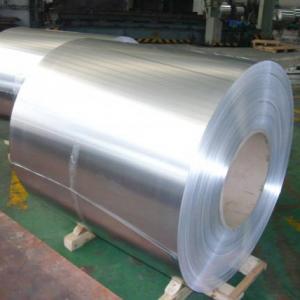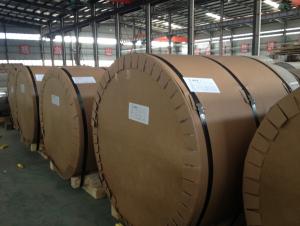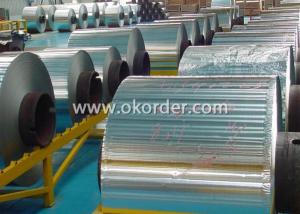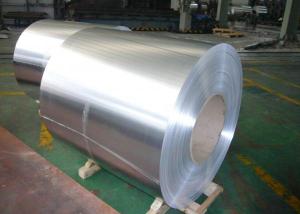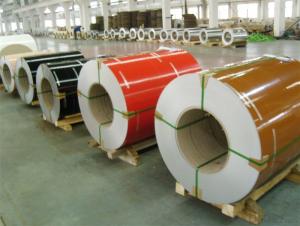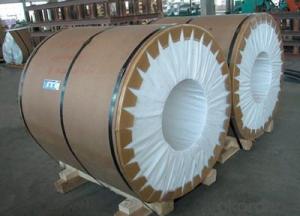3105 Aluminium Coils Products Manufacturers
- Loading Port:
- China main port
- Payment Terms:
- TT or L/C
- Min Order Qty:
- 3000 m.t.
- Supply Capability:
- 10000 m.t./month
OKorder Service Pledge
OKorder Financial Service
You Might Also Like
1. Specifications of 3105 Aluminium Coils
Alloy | AA3105 |
Temper: | H12, H14, H16, H18, H22, H24, H26, H32,HO, F |
Thickness: | 0.10-500mm |
Width: | 10mm- 2200mm |
Standard: | GB/T3880-2006, ASTM, ISO, EU standard |
Special Specification is available on customer’s requirement | |
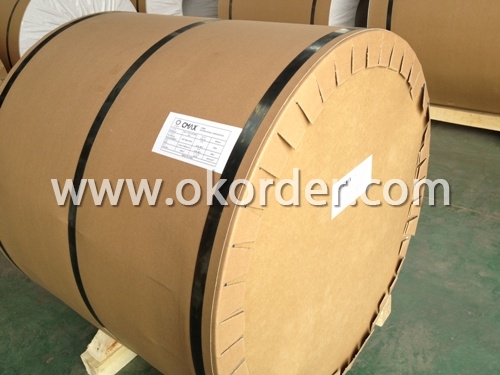
2. Applications of 3105 Aluminium Coils
3105 Aluminium Coils are of high plasticity, hard in corrosion, good at electrical and thermal conductivity.
3105 Aluminium Coils are widely used in air conditioner, aluminium composite panel, aluminium ceiling, road traffic sign, decoration, cover material, piping, refrigeration, automobile, etc.
3. Package & Delivery of 3105 Aluminium Coils
Seaworthy package, water-proof paper wrapped inside, carton wrapped outside in wooden pallets by 20FCL or 40GP.
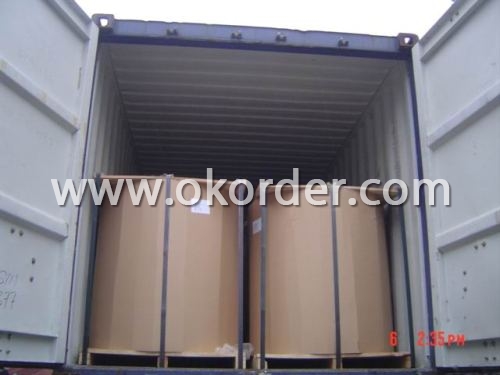
4. Production Flow of 3105 Aluminium Coils
The main producingprocedure includes the following steps:
Rolling--Annealing--Slitting--Sawing, Cut-To-Length, Shearing
New research shows that the future of automotive aluminum sheet demand will grow at an unprecedented rate. 2014 and 2015 is considered to be an turning point that steering the automotive industry from the traditional steel to other lightweight materials and aluminum sheet, including the use of aluminum sheet instead of advanced high strength steels (AHSS).
Promote energy saving in the global situation, the lightweight technology of the automobile industry brought to the agenda. Automobile cover of aluminum alloy sheet is a simple and effective way to reduce the weight. Automotive aluminum sheet high-end aluminum species in one, because of its performance (shaping, connections, etc.) and surface quality of the stringent requirements, but also to the processing of raw materials made finer control management requirements.
Overall, the use of aluminum sheet and other lightweight materials will become a significant feature of heavy vehicles, such as pickup, SUV and so on. The AHSS is likely to continue in light vehicles in use, this can reduce the body weight of about 100 kg.
The use of aluminum sheet in automobiles processing of raw materials and production processes impact on the environment, but in the use phase will reduce the environmental impact. The most critical thing is that the entire life cycle of the cars with the use of aluminum will reduce the impact of environment. Thus, in the automotive industry, using aluminum sheet instead of steel will continue be the develop trend.
2012--2015 years, the North American light vehicle aluminum consumption grew by 28% (growth of automobile production and the growth of the aluminum material content). 2025, pickup body portion 75% of the train will be composed of aluminum material, large cars 24%, SUV22%, 18% other small vehicles.
The popularity of the automobile industry is the development and application of energy, environmental protection and safety of these three issues are closely related. Although the car as a symbol of modernization and social development, social progress and brought prosperity, but also brought energy, environmental protection, transportation, land and other issues. Undoubtedly, these require the auto industry itself and related industries to explore joint research to be resolved.
Most of the domestic automobile industry, aluminum production companies do not have the background and related technology base, still in imitation stage abroad, the theoretical mechanism and technically at a disadvantage.
North American and European automotive aluminum content will be the highest, in addition to Asia (especially China) is still the largest market for lightweight vehicles.
- Q:How do aluminum coils contribute to sustainable manufacturing practices?
- The numerous environmental and economic benefits of aluminum coils make them crucial for promoting sustainable manufacturing practices. To start, aluminum is an incredibly recyclable material, with almost 75% of all aluminum ever produced still in use today. This means that aluminum coils can be recycled and reused multiple times without losing their quality or performance. Unlike producing new aluminum, recycling aluminum requires only a fraction of the energy, resulting in significant energy savings and reduced greenhouse gas emissions. Furthermore, the lightweight nature of aluminum coils contributes to energy efficiency in transportation and reduces fuel consumption during shipping. This characteristic allows for more efficient use of resources, as less material is needed to achieve the same strength and durability compared to other metals. Consequently, this not only reduces the overall weight of products but also lowers the energy required for their fabrication and transportation. Moreover, the excellent corrosion resistance of aluminum coils extends their lifespan and reduces the need for frequent replacement. This factor not only saves resources but also reduces waste generation and associated environmental impacts. Additionally, aluminum coils are non-toxic and do not release harmful substances into the environment, making them a safe and sustainable choice for various manufacturing applications. In terms of economic benefits, aluminum coils contribute to sustainable manufacturing practices by offering cost savings throughout their lifecycle. The recyclability of aluminum reduces the need for raw material extraction, thereby lowering operational costs and dependence on virgin resources. Additionally, the lightweight nature of aluminum coils allows for more efficient use of energy and resources, resulting in reduced manufacturing and transportation costs. In conclusion, aluminum coils are essential for promoting sustainable manufacturing practices due to their recyclability, lightweight nature, corrosion resistance, non-toxicity, and cost-saving benefits. By integrating aluminum coils into manufacturing processes, companies can reduce their environmental footprint, conserve resources, promote energy efficiency, and contribute to a more sustainable and greener future.
- Q:How do aluminum coils compare to plastic coils in terms of durability?
- Aluminum coils are generally more durable than plastic coils. They are resistant to corrosion and can withstand high temperatures, making them suitable for various applications. Plastic coils, on the other hand, are more prone to wear and tear, especially in harsh environments or with heavy usage. While both types have their own advantages, aluminum coils are generally considered to be more durable in the long run.
- Q:Can aluminum coils be used for food storage and processing?
- Yes, aluminum coils can be used for food storage and processing. Aluminum is a versatile and safe material for food-related applications due to its corrosion resistance, lightweight nature, and ability to withstand extreme temperatures. It is commonly used in the food industry for packaging, cooking utensils, and processing equipment.
- Q:How much does it cost to extract aluminium from its raw ore? Also how much does extracted aluminium sell for? I cannot find this anywhere on the internet. I would really appreciate some help.
- The Cost Of Aluminium
- Q:How exactly can you tell (just by looking) that the nipple used to tighten a spoke is brass and not aluminum? I know some are silver - not sure if they are painted silver or what. But without scraping or causing any damage to the nipple, how would one know for sure if they have no experience between the two.p.s. I don't know how heavy or light either is, so if that is one way to tel, it's not a good way for me.
- Well, in reality you can't tell just by looking. Aluminum nipples are generally only found on superlight race wheels rather than run-of-the-mill stuff. Brass nipples are hardly ever gold colored- they are usually chrome plated or black while aluminum and plain steel nipples can be just about any color. Aluminum nipples are VERY soft compared to brass and will strip and fail in the hands of the amateur builder or repair person. UNfortunately, this is the best way to determine whether a nipple is aluminum or brass while on the wheel- when it fails due to poor skills or overstressing the wheel.
- Q:Can aluminum coils be used in low-friction applications?
- Yes, aluminum coils can be used in low-friction applications. Aluminum is a lightweight and corrosion-resistant material that has excellent thermal conductivity. These properties make it suitable for various applications where low-friction is desired. In industries such as automotive, aerospace, and HVAC systems, aluminum coils are often used in heat exchangers, evaporators, condensers, and cooling coils. These coils are designed to efficiently transfer heat, while minimizing friction and energy loss. Additionally, aluminum coils can be used in electrical motors, generators, and transformers, where low friction is essential for smooth operation and reduced energy consumption. The lightweight nature of aluminum also helps to reduce the overall weight of the system, leading to improved efficiency. Furthermore, aluminum coils can be utilized in various types of machinery and equipment that require low friction, such as conveyor systems, sliding mechanisms, and bearings. Aluminum's low coefficient of friction allows for smooth and efficient movement, minimizing wear and tear on the components. Overall, aluminum coils are a versatile solution for low-friction applications due to their lightweight, corrosion-resistant, and thermally conductive properties. Their use can lead to improved energy efficiency, reduced maintenance costs, and enhanced performance in a wide range of industries.
- Q:What are the common cleaning and maintenance products for aluminum coils?
- There are several common cleaning and maintenance products that are suitable for aluminum coils. Firstly, a mild detergent mixed with water is a popular choice for cleaning aluminum coils. This solution can be applied to the coils using a soft brush or cloth, and then rinsed off with water. Another commonly used product is a coil cleaner specifically designed for aluminum surfaces. These cleaners are usually available in spray or foam form, and are effective in removing dirt, grease, and oxidation from the coils. It is important to follow the instructions provided by the manufacturer while using these cleaners. In addition, a mixture of white vinegar and water can also be used to clean aluminum coils. This natural cleaning solution is effective in removing mineral deposits and stains from the coils. It can be applied using a cloth or sponge, and then rinsed off with water. Regular maintenance of aluminum coils also involves the use of a coil coating or sealant. These products create a protective layer on the surface of the coils, preventing corrosion and extending their lifespan. It is recommended to apply the coating or sealant as per the manufacturer's instructions. It is important to note that when cleaning and maintaining aluminum coils, it is advisable to avoid using abrasive cleaners, bleach, or harsh chemicals, as they can cause damage to the coils. Additionally, it is recommended to consult the manufacturer's guidelines or seek professional advice if unsure about the appropriate cleaning and maintenance products for specific aluminum coils.
- Q:Are aluminum coils resistant to oil and grease?
- Yes, aluminum coils are generally resistant to oil and grease.
- Q:What is the role of aluminum coils in the construction of sports stadiums?
- Aluminum coils are commonly used in the construction of sports stadiums for their durability, lightweight nature, and excellent thermal conductivity. These coils are typically utilized in the fabrication of roofing systems, façades, and ventilation systems. They provide structural support, weather resistance, and efficient heat transfer, ensuring the longevity and comfort of the stadium. Additionally, aluminum coils offer design flexibility, allowing architects to create visually appealing and modern stadium structures.
- Q:How are aluminum coils used in the production of power transmission lines?
- Due to their unique properties and benefits, aluminum coils are extensively used in the production of power transmission lines. These coils, typically made from high-quality aluminum alloys, offer excellent conductivity, strength, and corrosion resistance. A key application of aluminum coils in power transmission lines is their use in manufacturing overhead conductors. These conductors transmit electrical energy from power plants to substations and distribution networks. Aluminum coils are used to create the conductive core of these overhead conductors because aluminum has lower resistance compared to metals like copper. This low resistance allows for efficient electricity transmission over long distances, minimizing energy loss and improving system performance. In addition, aluminum coils are lighter than copper coils, making them easier to handle and install. This characteristic significantly reduces transportation, installation, and maintenance costs of power transmission lines. Consequently, aluminum coils have become the preferred choice for overhead conductors in power transmission systems worldwide. Moreover, the corrosion resistance of aluminum coils ensures the long-term durability and reliability of power transmission lines. Aluminum naturally develops a protective oxide layer that prevents further corrosion, even in harsh environmental conditions. This corrosion resistance extends the lifespan of transmission lines, reducing the need for frequent repairs or replacements. In conclusion, aluminum coils play a vital role in the production of power transmission lines. They enable efficient electricity transmission, reduce costs, and provide long-lasting corrosion resistance. With these advantages, aluminum coils have become widely adopted in the power industry to enhance the performance and reliability of power transmission systems.
1. Manufacturer Overview |
|
|---|---|
| Location | Henan,China |
| Year Established | 2002 |
| Annual Output Value | Above US$200 Million |
| Main Markets | Mid East;Eastern Europe;North America |
| Company Certifications | ISO 9001:2000;ISO 14001:2004;OHSAS 18001 |
2. Manufacturer Certificates |
|
|---|---|
| a) Certification Name | |
| Range | |
| Reference | |
| Validity Period | |
3. Manufacturer Capability |
|
|---|---|
| a)Trade Capacity | |
| Nearest Port | Shanghai |
| Export Percentage | 30%-50% |
| No.of Employees in Trade Department | 21-50 People |
| Language Spoken: | English;Chinese |
| b)Factory Information | |
| Factory Size: | Above 100,000 square meters |
| No. of Production Lines | Above 10 |
| Contract Manufacturing | OEM Service Offered;Design Service Offered |
| Product Price Range | Average |
Send your message to us
3105 Aluminium Coils Products Manufacturers
- Loading Port:
- China main port
- Payment Terms:
- TT or L/C
- Min Order Qty:
- 3000 m.t.
- Supply Capability:
- 10000 m.t./month
OKorder Service Pledge
OKorder Financial Service
Similar products
New products
Hot products
Hot Searches
Related keywords
